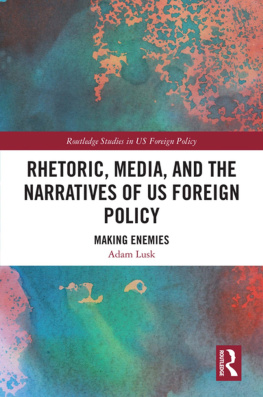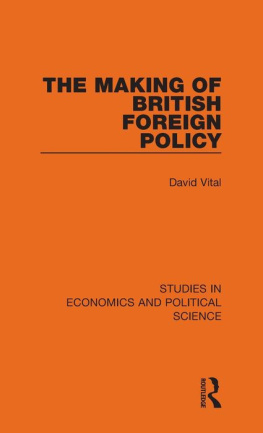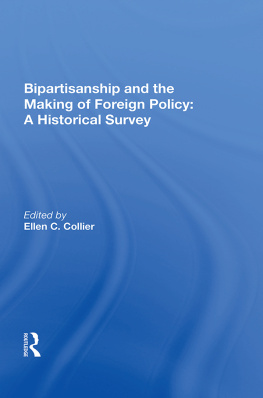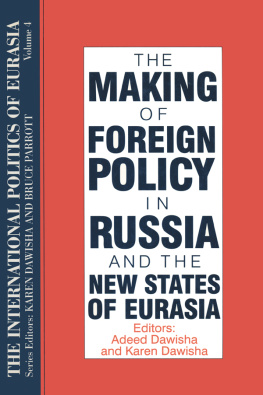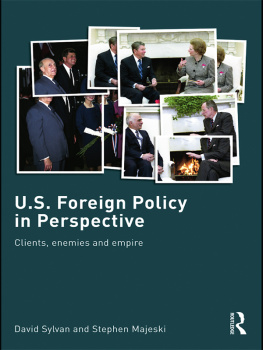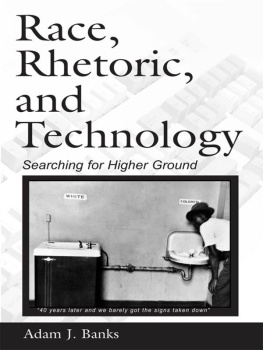Rhetoric, Media, and the Narratives of US Foreign Policy
Rhetoric, Media, and the Narratives of US Foreign Policy: Making Enemies studies the process of communicating threats to the US public and explores when and why the American public believes another country or regime is a threat.
Through a comparative and historical study, the author focuses on how the media environment enables and constrains rhetorical strategies deployed to construct, reproduce, and change narratives about a threat. Recent literature on threat inflation, securitization, and critical security studies returned to the concept of threat. Building on this renewed conceptual attention, this book examines why and how policy makers and other public figures, in particular the President, convince the public about a threat and will be of interest to students and academics in the disciplines of political science, international relations, foreign policy, security studies, and contemporary history.
Adam Lusk is an Associate Professor of Political Science at Rosemont College, USA. He teaches courses in International Relations and Comparative Politics, as well as First Year Connections Seminar. His research interests include international security, threat perception, global environmental politics, and norms and ethics in International Relations.
Routledge Studies in US Foreign Policy
Series Editors:
Inderjeet Parmar, City University, and John Dumbrell, University of Durham
This new series sets out to publish high-quality works by leading and emerging scholars critically engaging with United States Foreign Policy. The series welcomes a variety of approaches to the subject and draws on scholarship from international relations, security studies, international political economy, foreign policy analysis and contemporary international history.
Subjects covered include the role of administrations and institutions, the media, think tanks, ideologues and intellectuals, elites, transnational corporations, public opinion, and pressure groups in shaping foreign policy, US relations with individual nations, with global regions and global institutions and Americas evolving strategic and military policies.
The series aims to provide a range of books from individual research monographs and edited collections to textbooks and supplemental reading for scholars, researchers, policy analysts and students.
US Power and the Social State in Brazil
Legal modernization in the Global South
Jlio Cattai
The United States and Greek-Turkish Relations
The guardians dilemma
Spyros Katsoulas
Rhetoric, Media, and the Narratives of US Foreign Policy
Making enemies
Adam Lusk
For more information about this series, please visit: www.routledge.com/series/RSUSFP
First published 2022
by Routledge
2 Park Square, Milton Park, Abingdon, Oxon OX14 4RN
and by Routledge
605 Third Avenue, New York, NY 10158
Routledge is an imprint of the Taylor & Francis Group, an informa business
2022 Adam Lusk
The right of Adam Lusk to be identified as author of this work has been asserted in accordance with sections 77 and 78 of the Copyright, Designs and Patents Act 1988.
All rights reserved. No part of this book may be reprinted or reproduced or utilised in any form or by any electronic, mechanical, or other means, now known or hereafter invented, including photocopying and recording, or in any information storage or retrieval system, without permission in writing from the publishers.
Trademark notice: Product or corporate names may be trademarks or registered trademarks, and are used only for identification and explanation without intent to infringe.
British Library Cataloguing-in-Publication Data
A catalogue record for this book is available from the British Library
Library of Congress Cataloging-in-Publication Data
Names: Lusk, Adam, author.
Title: Rhetoric, media, and the narratives of US foreign policy : making enemies / Adam Lusk.
Description: Abingdon, Oxon ; New York, NY : Routledge, 2022. |
Series: Routledge studies in US foreign policy | Includes bibliographical references and index.
Identifiers: LCCN 2021037450 (print) | LCCN 2021037451 (ebook) | ISBN 9780367367589 (hardback) | ISBN 9781032169958 (paperback) | ISBN 9780429351235 (ebook)
Subjects: LCSH: United StatesForeign relationsPublic opinion. | RhetoricPolitical aspectsUnited States. | Mass media and international relationsUnited States. | PresidentsUnited StatesLanguage. | United StatesForeign relations20th century.
Classification: LCC JZ1480.A5 L87 2022 (print) | LCC JZ1480.A5 (ebook) | DDC 327.73dc23
LC record available at https://lccn.loc.gov/2021037450
LC ebook record available at https://lccn.loc.gov/2021037451
ISBN: 978-0-367-36758-9 (hbk)
ISBN: 978-1-032-16995-8 (pbk)
ISBN: 978-0-429-35123-5 (ebk)
DOI: 10.4324/9780429351235
Typeset in Times New Roman
by codeMantra
For Talene, Angel, Gabriella, and Faith
Figures
3.1 Chile as a threat to the US
3.2 Chile as a sister republic
3.3 Non-intervention in Chilean civil war
3.4 Riots as Valparaiso and Chile as a threat
3.5 Non-intervention and riots in Valparaiso
3.6 Overview map of narratives
3.7 Spain as a threat, the US as defender
3.8 War is bad for business
3.9 Spain as a threat to US interests
3.10 Overview map of narratives
4.1 US public opinion on Germany
4.2 Nazi Germany as a threat
4.3 US non-intervention
4.4 US cooperation with Russia
4.5 USSR as threat
4.6 USSR not a threat
5.1 US public opinion on Nicaragua
5.2 Nicaragua threat
5.3 Non-intervention in Nicaragua
5.4 US public opinion on Panama
5.5 Panama threat
5.6 Non-intervention in Panama
5.7 Television versus newspaper
About the author
Adam Lusk is an Associate Professor of Political Science at Rosemont College, USA. He teaches courses in International Relations and Comparative Politics, as well as First Year Connections Seminar. His research interests include international security, threat perception, global environmental politics, and norms and ethics in International Relations. Current scholarship focuses on debates about US foreign policy to understand how war becomes justified, and the relationship between global environmental issues and international security. He also publishes on pedagogy and active learning in the political science classroom. He lives in the Philadelphia suburbs with his wife, three daughters, and growing collection of pets, including a new puppy, where he gardens, cooks, coaches, and gets easily distracted, especially by his sports teams.
Preface and acknowledgments
The start of this book project began many years ago far more than I want to admit even to myself. I am not sure if this is a common experience, but there is something awe-inspiring about writing a book. I was told (with apologies that I cannot remember who said it) that when you try to write something is when you realize how little you know. I very much feel like I know less about international relations and security studies than ever before. The more I write and research, the more that I want to include, even as I realize the need to refine and remove what I have already written. I am overwhelmed by the feeling that I need to finish this project even though I recognized it is not finished. Therefore, I acknowledge the failure of what could have been the paths not taken and the scholarship that I did not include, either through ignorance or incompetence. I must admit, and probably should have addressed more in the pages to come, that I did have a normative agenda in writing this book. I hoped to explore not only the political nature of threats but also their illegitimacy in trying to live in a better world. To do so, I suggest we interrogate the world we live in and how it came to be, thereby uncovering and exposing the practices and efforts to distance us from one another. For while there might always be threats, may we always critique their nature.

